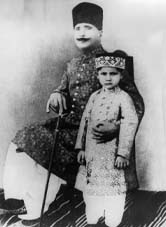'Iqbal would have reacted to affairs in Pakistan the same way as Gandhi to affairs in India'
 November 9 was the birth anniversary of Allama Iqbal. This post is a bit late, but then one need not remember the birth and death anniversaries of a personality like Allama Iqbal to write about him. Allama Iqbal is an evergreen personality, and will always be popular among academicians and scholars.
November 9 was the birth anniversary of Allama Iqbal. This post is a bit late, but then one need not remember the birth and death anniversaries of a personality like Allama Iqbal to write about him. Allama Iqbal is an evergreen personality, and will always be popular among academicians and scholars.Although much has been written about Jinnah and his role in the creation of Pakistan, Allama Mohammed Iqbal seems to have faded away from public memory.
Many historians believe it was Iqbal's letters to Jinnah, written to him when he was in England, that got him back to India, after which Jinnah took up the cause of Pakistan fervently. Dr Javed Iqbal talks about his father to Sunday Mid Day.
Do you think historians and politicians from India and Pakistan have viewed Iqbal according to their own convenience, making Iqbal, the poet, suffer in the bargain?
Iqbal was a multi-dimensional thinker. It is possible that he is known in India more as a poet, whereas in Pakistan he is acknowledged essentially as poet-philosopher and a political thinker. He has not suffered in the bargain because he is poet, philosopher and political thinker at the same time.
Is it true that some of Allama Iqbals lectures are banned in Saudi Arabia?
No. However, I am aware that some conservative Muslim scholars disagree with his interpretation of Islamic thought.
Muttahida Qaumi Movements MQM, (a party which represents Muslims who migrated to Pakistan from India in the post-partition era) leader, Altaf Hussain, has admitted that Partition was a big mistake. After the creation of Bangladesh, dont you think culture is a more binding force than religion? Even poet Iqbal called Lord Ram Imam-e-Hind.
The MQM leader who made this statement has fled from Pakistan under the fear of assassination at the hands of his own party faction.
He has adopted British nationality and lives in England as opposed to India, which seems inconsistent with his views on Partition.
As far as Bangladesh is concerned, if culture is a more binding force than religion, then Bangladesh should have merged with West Bengal rather than emphasising on its own identity as an independent Muslim nation-state.
Iqbal did consider Lord Rama as Imam-e-Hind because he respected the religion and culture of the Hindus. His Muslim philosophy was not based on the hatred of religious and cultural traditions of others.
Jinnah is quoted as saying, Iqbal is not a politician. He is a poet and a poets dream. How do you describe their relationship?
The statement attributed to Jinnah is false. In the introduction to Iqbals Letters To Jinnah, he writes that Iqbal was not only a poet and a philosopher, but he was his guide and stood as a rock by his side during the struggle for the establishment of Pakistan.
He is also stated to have remarked that if he was given the choice between becoming the head of state of Pakistan and acquiring all the works of Iqbal, he would chose the latter.
There were many other Muslim leaders like Maulana Azad, Dr M A Ansari, Khan Abdul Gaffar Khan, Maulana Hussain Madani, who were certainly more devout than Jinnah. Why did Iqbal choose Jinnah, who even didnt know Urdu, to plead for Pakistan?
Because Iqbal felt that Jinnah was more sincere to the cause of Muslims than any other Muslim leader of the sub-continent.
How would have Iqbal reacted to the present state of affairs in Pakistan?
The same as Mahatma Gandhi would have reacted to the present state of affairs in India. I am referring to the demolition of the Babri Masjid and the massacre of Muslims in the state of Gujarat.
From Sare Jahan Se Achcha Hindustan Hamara to his poems respecting Hindu gods, Iqbal has devoted much of his work in praise of India and its composite culture. Doesnt this show that he had a sense of belonging with India?
No. The poem was written during the earlier phase in Iqbals life, when he was an Indian nationalist. He was thereafter forced to change his mind as he became disappointed with the Hindu leaderships inflexibility and rigidity.
Is your ancestral family, who didn't embrace Islam, still in Kashmir?
I do not know exactly. In the Sapru clan, one Hindu gained eminence the late Sir Tej Bahadur Sapru. He did not live in Kashmir but I understand he lived and died in Allahabad.
What according to you is the solution to the Kashmir problem?
The Kashmiris must be given the choice to consider remaining with India or joining Pakistan.
Who was Allama Iqbal?
Allama Iqbal, poet, philosopher and political leader, was born in Sialkot, Punjab, in 1877.
After studying in Lahore and Europe he became a barrister. He returned to India in 1908. Besides teaching and practicing law, Iqbal remain devoted to his passion writing poetry.
By 1928, his reputation as a great Muslim philosopher was established. In 1930, Iqbal was invited to preside over the open session of the Muslim League at Allahabad.
In his historic Allahabad address, Iqbal visualised a sovereign state for Muslims in north-western India.
Later, through a series of letters dated between June 1936 to November 1937, Iqbal conveyed to Jinnah his personal views on the political problems of Indian Muslims and persuaded him to come back from England. Iqbal died on April 21, 1938.


Comments
Post a Comment